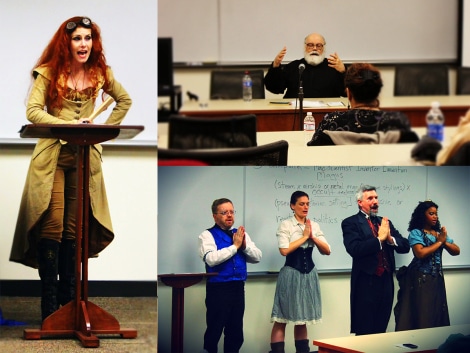Chicago’s long history with esotericism, occultism, and alternative spirituality allows students to explore the disciplines of anthropology, rhetoric, and sociology, through the diverse belief systems that thrive in the city. WRD Instructor Jason Winslade has incorporated themes of occultism in his Explore Chicago classes since 2000. Winsalde’s course “Unveiling Occult Chicago: Secret Societies, Magicians, and Alternative Spiritualities,” examines how the Chicago occult community has influenced mainstream rhetoric and values, particularly politics and activism.
“Every mainstream religion has its past in esotericism…it is part and parcel of our culture. It’s important to point out to scholars and other academics, and students, that this isn’t this separate fringe thing; it’s ingrained in us and the way we think,” said Winslade.
Students in Winslade’s AQ2012 “Unveiling Occult Chicago” course had the opportunity to present their coursework at “Mapping the Occult City: Magik and Esotericism in the Urban Utopia.” This pre-conference to the 2012 Annual Meeting of the American Academy of Religions was organized by Winslade in partnership with the Phoenix Rising Academy and the WRD program. Students Nikki Kaplan, Lilli Gregory, Rachel Berg, and Alyssa Walker gave their presentation “Occult Chicago: An Urban History” to a crowd of over 100 international and local AAR members and occult scholars. The presentation focused on the 1893 Columbian Exposition and the World Parliament of Religions, and highlighted the students’ examination of a diverse Chicago community
 “Mapping the Occult City” also featured discussion panels from occult scholars and community founders, a walking tour of historical occult landmarks, and a lecture by renowned author Michael Bertiaux. Terra Mysterium, a collective of Chicago artists, ended the conference with a performance and closing discussion on popular occult rhetoricians and publications.
“Mapping the Occult City” also featured discussion panels from occult scholars and community founders, a walking tour of historical occult landmarks, and a lecture by renowned author Michael Bertiaux. Terra Mysterium, a collective of Chicago artists, ended the conference with a performance and closing discussion on popular occult rhetoricians and publications.
Winslade said events such as “Mapping the Occult City” are important as esotericism plays a deep part in our culture and language systems. A second conference is in the planning stages and Winslade hopes to involve more students and members of the DePaul community.
